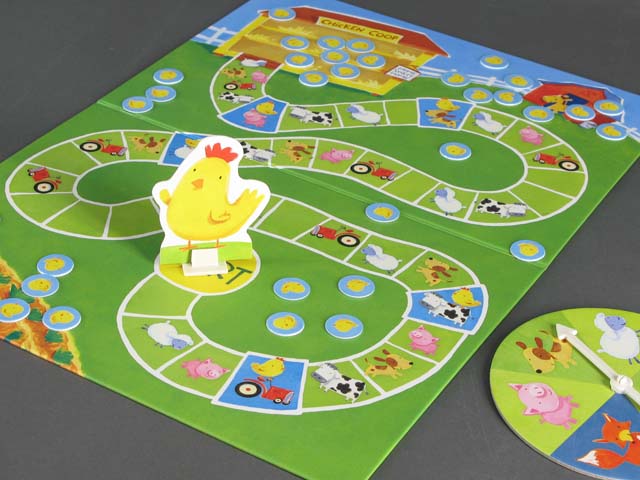Count Your Chickens
Players: 2 or more
Ages: 3 and up
Purchase: Buy on Amazon (affiliate link)
Math Ideas: Counting, one-to-one correspondence, cardinality
Questions to Ask:
What is the best animal to spin this turn? How many spaces away is it?
Last week we looked at a great game for fractions, one of the most complex aspects of numerical reasoning that your child will experience in elementary school.
This week, we zoom all the way back to the foundation of all other numerical reasoning: counting.
Before you had kids, you might have thought that counting was an easy, natural thing to learn. At least, that's how I felt.
But as I watched my son race his way through the numbers, counting "onetwothreefourfivesixseven" as he pointed to the five goldfish on his plate, I realized there was a lot more depth to counting than I had realized.
Count Your Chickens, this week's game recommendation, is a great way to see your preschool child's progression with counting, and a springboard to even deeper mathematical questions.
How to Play
Count Your Chickens is a cooperative game from Peaceable Kingdom. This company makes a bunch of great cooperative math games for young kids, including Race to the Treasure, which I reviewed last year.
As in other cooperative games, the players are working together to win the game. In this game, you spin a spinner to determine which animal to move to. Then you move that number of spaces, being sure to count the number of spaces you've moved along the path. Finally, you take that number of chicken tokens and return them to the chicken coop. The goal of the game is to return all the chickens to the coop before your player reaches the end of the game board.
This is a great first board game for your child because the rules are extremely simple, the players all work together, and honestly they usually win. And along the way, you learn a lot about how they count.
Where's the Math?
Count Your Chickens is a counting game, so the game really highlights that mathematical skill. But as I mentioned above, there is a whole lot more to counting than you might think.
First of all, the game gets kids to focus on one-to-one correspondence. This is the ability to match each number word with an object. If you place six chickens in front of your child, you might notice that they recite the numbers words at a different speed than they point. As a result, they may miscount the chickens.
The goal is to help your child so that every time they say a number word like "one" or "two," they are pointing to a specific object. One number matches one object, which is the core of one-to-one correspondence.
The game is great for counting practice because kids have to alternate between counting spaces on a board (which is more abstract and challenging) with counting little chicken tokens. The physical act of picking up each token is a great way to engrain the connection between word and object.
Questions to Ask
Count Your Chickens is a great game for young kids, but I'd be lying if I told you it was captivating for adults, or even older kids. As a result, I think most of the enjoyment that you'll get from the game is the pleasure you get from a great math conversation with your kids.
I love questions that get your child to anticipate their next move. In this game, you can ask "Which animal is farthest away? If you spin that animal, how many spaces will you move?"
This questions gets your kids looking ahead, and it also doubles the amount of counting they do: they'll count once before they spin, then again once they actually spin an animal and move the required number of spaces.
You can also work on another counting skill, cardinality, while playing this game. Cardinality is the idea that, when counting, the last number you say is the amount of objects you counted.
Sounds natural, right? Well, it isn't when you're learning to count for the first time! I'd recommend you watch your child count out five chicken tokens, then ask "How many chicken tokens did you just move to the coop?"
If they have developed a strong sense of cardinality, they will immediately answer "five" as though it's the most natural answer in the world. But kids who are still developing cardinality might recount the tokens, or they might not even have a way to answer your question! Either way, you get to reinforce the idea with your child. "You moved five spaces, so you saved five chickens. Let's see how many chickens we can save this turn!"
Count Your Chickens is a perfect pre-school game. Your child learns about the structure of how games are played, and they get to practice a set of counting skills in a setting where precision helps you win.
Click here to buy Count Your Chickens on Amazon (affiliate link)





